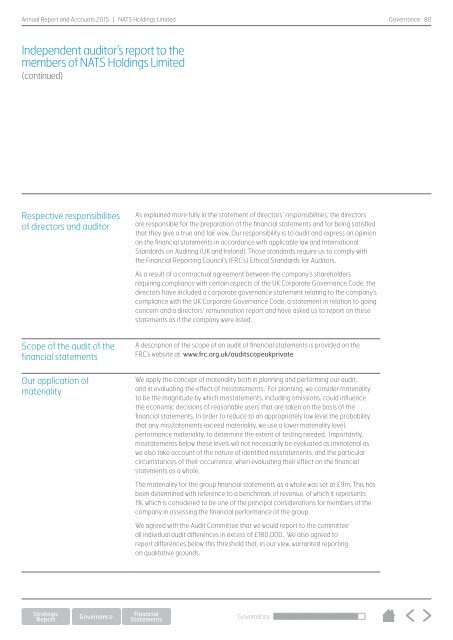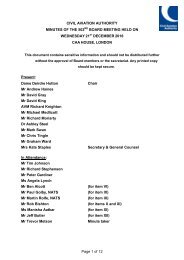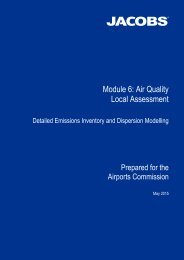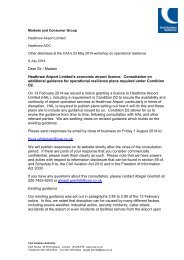NATS-Annual-Report-2015
NATS-Annual-Report-2015
NATS-Annual-Report-2015
You also want an ePaper? Increase the reach of your titles
YUMPU automatically turns print PDFs into web optimized ePapers that Google loves.
<strong>Annual</strong> <strong>Report</strong> and Accounts <strong>2015</strong> | <strong>NATS</strong> Holdings Limited<br />
Governance 80<br />
Independent auditor’s report to the<br />
members of <strong>NATS</strong> Holdings Limited<br />
(continued)<br />
Respective responsibilities<br />
of directors and auditor<br />
As explained more fully in the statement of directors’ responsibilities, the directors<br />
are responsible for the preparation of the financial statements and for being satisfied<br />
that they give a true and fair view. Our responsibility is to audit and express an opinion<br />
on the financial statements in accordance with applicable law and International<br />
Standards on Auditing (UK and Ireland). Those standards require us to comply with<br />
the Financial <strong>Report</strong>ing Council’s (FRC’s) Ethical Standards for Auditors.<br />
As a result of a contractual agreement between the company’s shareholders<br />
requiring compliance with certain aspects of the UK Corporate Governance Code, the<br />
directors have included a corporate governance statement relating to the company’s<br />
compliance with the UK Corporate Governance Code, a statement in relation to going<br />
concern and a directors’ remuneration report and have asked us to report on these<br />
statements as if the company were listed.<br />
Scope of the audit of the<br />
financial statements<br />
Our application of<br />
materiality<br />
A description of the scope of an audit of financial statements is provided on the<br />
FRC’s website at www.frc.org.uk/auditscopeukprivate<br />
We apply the concept of materiality both in planning and performing our audit,<br />
and in evaluating the effect of misstatements. For planning, we consider materiality<br />
to be the magnitude by which misstatements, including omissions, could influence<br />
the economic decisions of reasonable users that are taken on the basis of the<br />
financial statements. In order to reduce to an appropriately low level the probability<br />
that any misstatements exceed materiality, we use a lower materiality level,<br />
performance materiality, to determine the extent of testing needed. Importantly,<br />
misstatements below these levels will not necessarily be evaluated as immaterial as<br />
we also take account of the nature of identified misstatements, and the particular<br />
circumstances of their occurrence, when evaluating their effect on the financial<br />
statements as a whole.<br />
The materiality for the group financial statements as a whole was set at £9m. This has<br />
been determined with reference to a benchmark of revenue, of which it represents<br />
1%, which is considered to be one of the principal considerations for members of the<br />
company in assessing the financial performance of the group.<br />
We agreed with the Audit Committee that we would report to the committee<br />
all individual audit differences in excess of £180,000. We also agreed to<br />
report differences below this threshold that, in our view, warranted reporting<br />
on qualitative grounds.<br />
Governance






